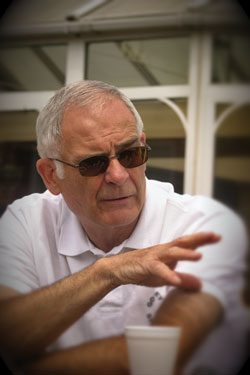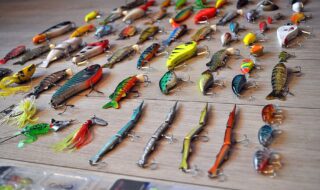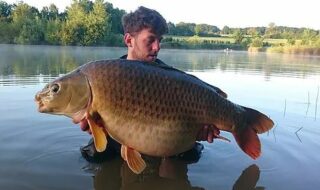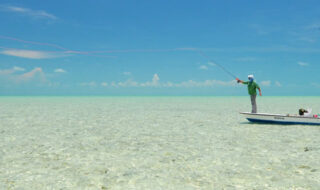Dave Harrell: I can’t remember exactly which year it was when I came here to fish the first invitation match you organised after you bought the venue. I do recall, though, playing and eventually losing a huge stillwater salmon that was well into double figures! Tell us about how Gold Valley came about…
John Raison: I remember that day well! While you were battling with that fish we all wondered what the hell you’d got on the other end… then you lost it! (He laughs.)
The venue, which was known as Springlakes back then, was in the hands of receivers and came up for sale in April, 1991. I made an offer of £550,000 for the site, which didn’t include the car park that we’ve now got or the bungalow, but the receivers who were selling it turned down the offer because they considered it was worth a lot more. By September it still hadn’t been sold and they needed to sell it so I put another offer in, this time for £340,000. There were two other bidders after the place but although their offers were higher than mine they didn’t have the money in place, so I got it. Development started in 1992 and that first match that you came on was in 1993.
DH: It’s changed so much since then. Take me through the development of the venue after you bought it.
JR: The lakes were originally gravel pits and the depth varied tremendously. Some places were only two feet deep while in other parts it was 30 feet. I decided that the best thing to do was to drain it completely and get the depths more consistent. Once all the water had gone it was empty for about six months, during which time we rebuilt all the banks, levelled the bottom and changed the shape of some of the lakes. Then we filled them back up with water.
DH: I think it’s fair to say that commercial match fishing as we know it started in the south, didn’t it?
JR: Yes, the early 1990s were the real start of it nationally. Before that the only two places where you could catch carp were Dryad, in Portsmouth, and Broadwater at Godalming. In those times, though, the people who controlled Broadwater didn’t really know what a gold mine they had. It could and should have been sold out every day of the week.
I remember taking William and my good friend Bobby George, the darts player, there when William was very young – 1985, I think it was – and we couldn’t believe just how many carp we caught. It was literally one after the other and, although we’re used to that sort of situation now, it was unheard of back then.
DH: When you bought Gold Valley how did you know how many fish to put in? These days there seem to be some clear guidelines but, back then, was it more trial and error?
JR: To be honest, it was 80 per cent luck and 20 per cent knowing what I was doing! I’d had some previous experience of fishery management, having bought a trout fishery in 1962, but carp were obviously a different proposition.
As the fishery here developed it was a case of getting the right balance of fish stocks to create a place that could consistently produce good catches. As time has gone on I’ve learned a tremendous amount, of course, and now I’m very proud of what we have created. By and large I sort out any problems myself, but if I need any help I talk to fishery consultant Bruno Broughton who, in my opinion, is the top man in the country in terms of fishery-management knowledge.
DH: When did you start match fishing?
JR: I went on my first club match with the Farnborough AS when I was six. My dad William, who was known as Bill to everybody, was the founder of the club and also the founder of our tackle business in 1932.
That first match was on the River Lodden and I remember I caught one bleak and one dace. After that I used to join my dad on most of the club matches but he’d never let me go on my own until I could swim. I eventually learnt to swim at school and one day, again on the Lodden, after I told him I’d mastered it he told me to swim over to the far bank and back again to prove it – which I did! From that point on I went fishing as often as I could, both for pleasure and in matches.
DH: Any memorable matches?
JR: One that stands out was a Southern Top 40 event on the Lodden in the early 1980s. The match was fished by the likes of Steve Gardener, Ken Collings, John Wilkinson and all the top southern matchmen of the time. I won the match with 23lb, which comprised three barbel, two bream and about 8lb of roach. I fished a really good match that day and to finish first against such top-quality opposition was special.
Another special match that stands out for me was the prestigious 140-peg Hospital Cup match at Minley Lake, when I was 16 years old. It was a baking-hot day and it was always going to be tough as there were no carp there then, so the target species were mainly roach and perch. I didn’t fancy my draw on the day but I actually won the match with 3-7-0, which comprised 11 roach and a 21/2lb tench. I was thrilled to win against all the top anglers that were there.
DH: Favourite venues?
JR: The River Lodden is my all-time favourite place, closely followed by the River Thames. I’ve had a love affair with the Lodden since I that first outing when was a young boy and it’s still the same now. Unfortunately, there aren’t any matches there now but I still enjoy pleasure fishing there because it’s full of small fish.
DH: You must have met some great characters in your match fishing career. Which ones stand out for you?
JR: The one person who really stands out is Ivan Marks. The man was a legend and I learnt a lot from him. He was an amazing character and I doubt there will ever be another angler like him again.
More locally, I would say Roger Ackers and Craig Vincer. Roger was the best angler in this area, by far. He won the Broads Championship, the King’s Sedgemoor Championship and came second on the Middle Ouse Champs in the days when the matches were competed by several hundred anglers. He also finished second in the National, twice.
Craig was brilliant too, and I think that if he was fishing today he would be in the England team. He was such a natural angler who could turn his hand to all styles of fishing.
DH: Talk to me about Will now. His progression in match fishing has been nothing short of phenomenal. Did you intentionally groom him for success?
JR: No, not really. We obviously had the tackle shop and we owned a few stretches of river so, naturally, I did hope that he would develop an interest in fishing. I remember after he was born, my wife Vicky would look after him while I was out fishing every Saturday and Sunday. I used to say to her: “You’ve got him ‘til he’s four years old, then I’ve got him for the rest of his life!” And that’s exactly how it’s turned out to be, as once he was old enough he used to come on every match with me. We used to stay on after the matches for him to have a go and that eventually progressed to sessions at Willow Park, which was a great venue for him to learn on.
DH: Did you have to steer him in those early years?
JR: Not at all, he just loved coming with me on every occasion and by the time he was 10 he was really into it.
DH: Without stating the obvious, you must be incredibly proud of what Will has achieved so far. After all, he’s still quite young in match fishing terms.
JR: I am very proud, yes. Like you say, he’s achieved some great things so far but he’s still got plenty of ambition to achieve even more and I’m sure he will.
DH: Do you think he’s misunderstood at times? I’ve heard it said that he’s difficult to approach but I know that’s not true. I personally think that because of his success there are often too many people wanting access to him and, dare I say it, not always respectful of the pressures that he might be under before or during a match.
JR: I think he handles the pressures pretty well to be honest, but people must realise that he is only human and he’s under pressure to achieve and to be successful. As you well know there’s nothing worse than people trying to have a conversation with you while you’re trying to work things out in a match. Ivan Marks was the only angler who could fish successfully and entertain a crowd at the same time, and I don’t think there will ever be another like him. The time to ask questions is after the match has finished and Will is always prepared to answer questions then.
DH: I agree with you entirely. The problem is, match fishing is the only sport where ‘players’ of any level of ability can get such easy access to the top boys. It’s also one of the few sports where spectators can influence the outcome, and skylining is a big problem on some venues. I think some people need to show a bit more respect at times, and in turn they would reap more rewards by doing so.
Moving on, I know you attend all the World and European Championships. Do you have a certain role when you’re there?
JR: The role I take is that I normally fly out on the Wednesday or the Thursday before the Championship, by which time the squad has been practising there for a fortnight. Quite often some of the anglers might want something taking across, like a specific item of tackle or bait, so I try to help in that way. In the matches I run the bank in Will’s section and pass on information to Mark Addy and Mark Downes. The England set-up is so professional in this way, with runners on each section communicating with each other via walkie-talkies.
DH: Dick Clegg was a hard managerial act to follow. How do you feel the two Marks have done so far?
JR: They’ve done brilliantly well and never seem to miss a thing in the build-up to Championships. They make things happen and they are successful because they are experienced anglers themselves. They seem to be able to read situations much better than other nations’ coaches and managers. The quality of the anglers they have at their disposal makes for a strong challenge wherever the team is competing.
DH: What are your views on match fishing these days?
JR: In the south the turnouts in the open matches are down, on the whole, unless it’s a practice match for a Super League or Winter League. The club scene is buoyant down here but I’m worried that there aren’t enough young anglers coming through nationally.
DH: Do you think it’s down to cost?
JR: Maybe it is. Whatever the reason is we definitely need more youngsters in the game if it is to keep going in the future.
DH: Coming back to commercial fisheries, we’re in an era where more and more are being created. Have we reached saturation point, and how have the small commercials around here impacted on Gold Valley?
JR: I think that over the next four or five years there will be a lot of commercial fisheries for sale. There are a lot of fisheries in this area and every time a new one is created it simply dilutes the anglers still further. You end up with between 10 and 20 anglers on several venues, where years ago all of them competed at the same place in a bigger match.
Here at Gold Valley we always try to do things in a professional way and provide what the anglers want. Unfortunately, some of the smaller fisheries don’t bother to get planning permission and some don’t even have any public liability.
DH: Do you think commercial fisheries everywhere should have a standard set of rules?
JR: It’s a difficult thing to implement but in my opinion it’s something that’s got to come in at some point in the future. The rules here are quite relaxed now, and right for the fishery. The big problem is that a minority of anglers break and don’t respect rules, which is a shame for the majority who go about their fishing in a serious, honest way.
DH: Coming right up to date, what stage are you at in your fishing life now?
JR: Vicky and I are retiring next year and I intend to go fishing every day, apart from when I’m playing bowls! I’ve got some river matches coming up on the Kennet and the Thames, which I’m looking forward to. I love my river fishing and will continue to do so for as long as my health holds up.
DH: Is it true that Will is into bowls too?
JR: Yes it’s true, and he’s unbelievably good at that as well!
DH: Finally, what’s the future of Gold Valley?
JR: Gold Valley will continue just as it is. We’ve got hundreds of regular customers who keep coming back because they like it here and we provide them what they want in terms of fishing. We’ve worked very hard to create this fishery and I’m really proud of what we’ve achieved. Long may it continue!





